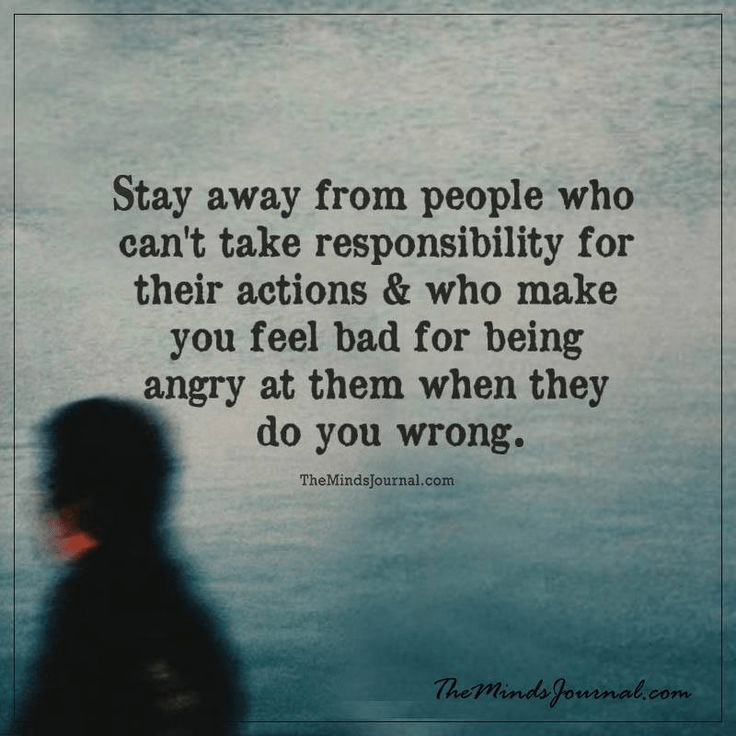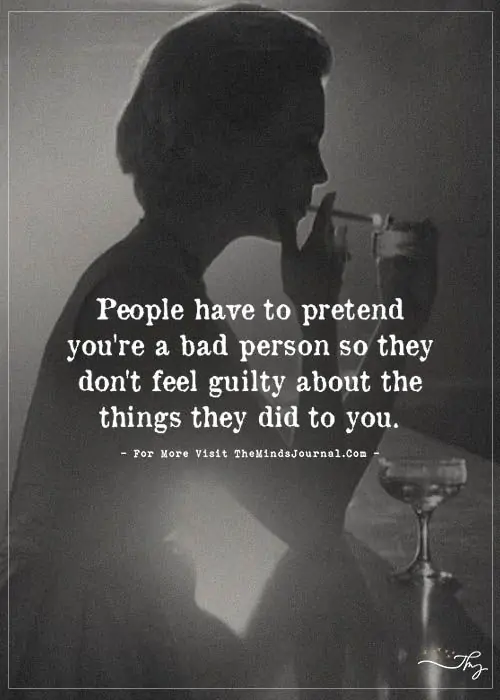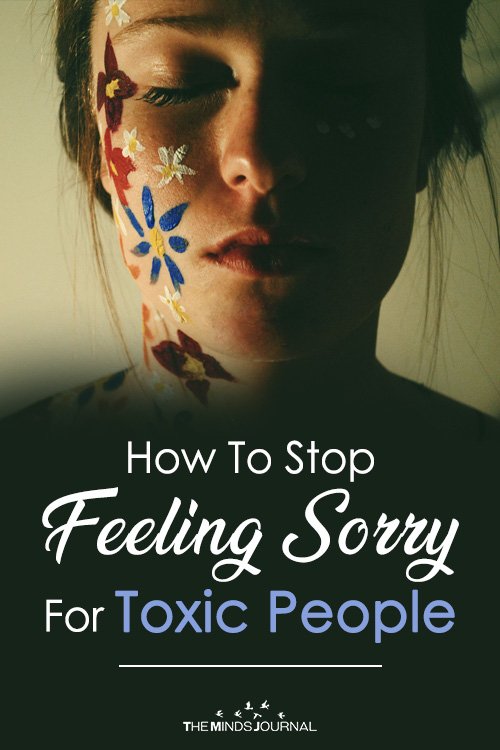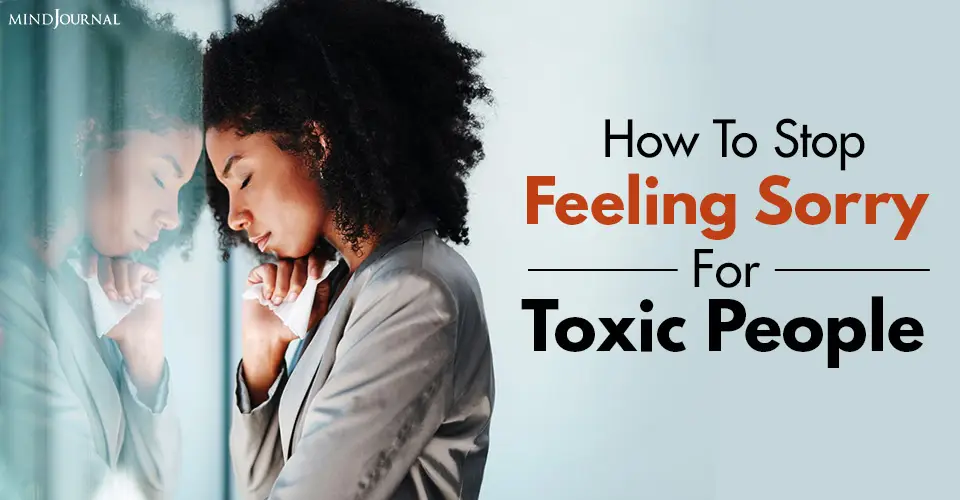When it comes to feeling sorry for toxic people, here’s a word of advice: Don’t. Whenever you are trying to understand why they behave the way they behave, and what is the story behind their toxicity, you are doing exactly what they want you to do. Which is, feeling sorry for them and getting tangled in their vicious web of lies and deceit.
The more compassion, care, and kindness their victim shows them, the more they are going to feed on their emotions and energy. This will then gradually transform into abuse, after which it’s difficult coming back from that.
Now, are you thinking about how you can stop feeling sorry for toxic people, which includes narcissists, sociopaths, and even narcopaths?
The answer is simple but not completely obvious. One absolutely has to engage the full use of their own logical brain… and prospectively try to provoke an internal Narcissistic Abuse recovery inspired change.
How can you stop feeling sorry for toxic people?
Narcissistic people are also known as the Cluster B personality type, and narcissistic abuse recovery experts always say that the most challenging part of dealing with them is realizing that what they are doing is wrong, and it is only you who can put a stop to it. You have to let go of your tunnel vision, and stop your heart from dictating your mind.
People who are inherently good and kind on the inside, especially empaths are seen as the right kind of prey by narcissists. Empaths tend to make the mistake of believing that they will be able to change the narcissist for the better, despite knowing their true nature. They constantly wrestle with themselves about the eternal dilemma of whether they should give up, or keep on trying to make the relationship work.
Causing other people physical, emotional, mental, and spiritual pain, especially those people who love them from the bottom of their hearts is what defines a narcissist, or a Cluster B individual. Be it toxic friends, toxic partners, or even toxic parents, the dance is all the same for them.
Emotionally wounded people never intentionally look to hurt others, because they know how it feels to be in pain. But people who are insecure, incomplete, and unhappy with who they are, are always looking to put other people down, to make themselves feel better, even if it’s for a few seconds.
Due to narcissistic abuse, wounded people tend to suffer from several physical ailments that are a result of constant stress and toxicity. This can also involve multiple mental health conditions such as anxiety, depression and posttraumatic stress disorder (PTSD).

Why are kind people always the target of narcissists?
As long as Highly Sensitive People fail to understand that narcissistic predators are not interested in their emotions and feelings, and if they keep on trying to see the good in them, they will waste a lot of their precious time by unknowingly turning themselves into sources of narcissistic supply. It’s a truth of life that kind people are always looking to help others, and helping others is what makes them feel good about themselves.
It could be an act so simple as helping a tortoise cross the road by stopping your car putting it in the park, turning on the hazard lights, and helping the little one get from hither to yon in a more expedient fashion or petting a dog and seeing its tail wagging to and fro.
Or, it could be something as simple as paying a compliment to a stranger — telling them something simple like you love their smile without implying a need for further contact.
It can also mean giving some of your time to be with someone who is grieving, helping a friend through a personal crisis, or simply just helping a random stranger with the right directions to the supermarket.
When a giving person gives, it produces a surge of pleasant sensations throughout the body, mind, and soul. People who are inherently compassionate and kind, whenever they feel low, sad, or dejected, all they need to do to feel better and safe is look back on a happy and positive thought. Sometimes witnessing positive things, or simply seeing happy things on social media even can help them feel hopeful, safe, and secure.
Narcissists look for victims who are exactly like this – hopeful, positive, optimistic, and most importantly, giving. Since nice people have so much narcissistic supply in them, it tempts the narcissist to no end. People Pleasers are also seen as prospective and even perfect victims of narcissistic abuse.
Related: 9 Signs You’re A People Pleaser
The more of a People Pleaser a person is by nature, the more likely they are to self-sacrifice in order to self-fulfill their nature. They are always looking to solve other people’s problems, and whenever they do, their happiness knows no bounds. Unfortunately, people pleasers tend to be born mostly in toxic families with toxic genetics within them.
With science progressing every passing day and coming closer to answers as to why certain people develop predatory and egocentric behaviors, there is a different side to this story too – It’s that sometimes, good things can also come out of dark and rough situations.
Interestingly, two Cluster B parents with the right kind of DNA can give birth to a kind, happy, loving, and positive child, with a strong sense of emotional intelligence and emotional intuition. People pleasers are very good at detecting a person’s emotions and feelings quite accurately. The better they are at this, the more they feel the need to help people. However, if they refuse to see the danger of trying to help a narcissistic and toxic person, chances are they will be stuck in a toxic cycle for a very long time.
Stuck in a hopelessly unfortunate and sad situation for a long, long time. Whenever a People Pleaser fails to understand that other human beings could be wired differently, they become easily deceived and fall into patterns of a savior or someone with Stockholm Syndrome.
The more a kind person grieves for the Cluster B person’s loss, the chances are they will spend a lot of time worrying and mourning for the other person. The kind empathic person will try their best in every social interaction possible to help the other person realize the error of their ways.
Likewise, perceiving a Cluster B person as lacking or missing out on the pleasure of giving or being kind simply because their minds are wired differently is not only tunnel-visioned, it’s EGOCENTRIC. It means a person who expects the same reward stimulus to excite a Narcissist, Sociopath, Psychopath, Narcopath, Enabler, or even an Empath is simply believing that what makes them happy will be toxic people happy too. You see the problem here?
What do toxic people think?
Narcissists love to show off in front of others about how ‘great’ they are, and being the center of attention is what makes them the happiest. Not only that, they are always looking to destroy their rivals, and anyone who they feel can dethrone them from the limelight.
Sociopaths, on the other hand, prefer to be more controlling and quiet with their manipulation tactics, while psychopaths are extremely anti-social, loud, and dramatic who have a flair for disrupting everything they touch. Psychopaths are more like emotional vampires who need more and more narcissistic supply from their victims, and nothing ever seems to be enough.
People with Histrionic Personality Disorder (HPD) tend to be the type who bursts into a room, forces the limelight to be on them by making an absolute fool of themselves, and then leave just as suddenly as they came. They are the drama queens of the group, who are always looking to gain attention with their annoying antics.
Empaths on the other hand, always look forward to connecting with others on an emotional and mental level and look to build meaningful and positive relationships. No matter what they do, they always try to leave everything better than when they found them, and making a good difference, wherever they do, is what truly makes them feel happy and content.
But what stimulates the pleasure centers of one’s brain, might not be the same for others.
A Sadist might get off on personally striving to torture another living, breathing, sentient creature or harming a person’s reputation directly by concocting some ridiculous smear campaign to defame them. A sociopath might thoroughly enjoy the feeling of constantly and aggressively stonewalling the person who loves and trusts them.
When a normal, decent person buys a house or gets a much-awaited promotion at work, how do they feel? Happy and excited, right? Well, that is how a normal person with normal intellect and brain behaves. Things like these give them happiness and pleasure. But for a Somatic Narcissist, it’s not the same story. For them buying a house or getting a promotion is a way of competing with others, even when there is no one competing with them.
This is because, for every Cluster B personality, every effort, social interaction, and life change is simply a manifestation of their endless and inherent sense of toxic competitiveness.
It’s quite apparent that what produces happiness in one type of person is likely to produce a boring reaction for another, when and if the brain lacks the capacity to perceive the other person’s reason why.
Related: 8 Types Of Toxic People You Should Leave Without Feeling Guilty
Are toxic people really unhappy on the inside?
When you were young, have you ever been told that people who are mean are not happy on the inside, have several emotional issues, and are full of insecurities? Well, it doesn’t always turn out to be 100% accurate, you know.
Cluster B personalities always think about themselves and their own needs first, at the cost of everyone else’s. That means the Alpha Lion in the family eats first, then his lioness, and scraps go to their children.
When a Cluster B person targets a prey, their pride comes tromping after the leader to assist in the kill. Once their meal for the day is secured, then they will lurk about, taking bites of the prey — but typically not until after the elder or stronger animal has eaten their proverbial fill.
Such is the way dysfunctional and toxic families operate. The individual who is emotionally intelligent, sensitive, mature and intuitive, is mentally and psychologically attacked over and over again by the Alpha predator.
Following that person’s lead, other toxic members of the family will swoop in to actively engage in provoking, mobbing, shaming, ridiculing, and gaslighting for fun, or actively participate in making them feel crazy.
Making other people miserable and unhappy activates the pleasure center of a Cluster B individual’s brain just like helping someone out of a crisis or through an emotionally turbulent period helps an Empath feel nice and accomplished.
This is where empaths go wrong. They believe that what floats their boat, floats others’ boats too, and helping and loving others’ makes them happy too. But the reality is not always that. That is why, there is always such a stark difference between them, and Cluster B people. Expecting everyone to be like them is not how it works, and it never did, to be honest.
Should we respect other people with regard to accepting them as they are rather than striving to change them?
Absolutely.
So, those people who have been treated as scapegoats and have been mistreated and abused time and time again, should they simply accept and overlook the egocentrism? Should they simply focus on moving on from the toxic behavior they were subjected to? NO. A big fat NO.

So, how can you handle toxic people, and not feel sorry for them at the same time?
Cluster B people need to be handled with kid gloves all the time, and even though this might seem absurd, but it’s the truth. Whatever they say, should be treated like a virus that has the capacity to cause moral and emotional decay in a person and their minds.
Related: 16 Things I Learned Trying To Love Someone Who Was Toxic For Me
The right way to feel when and if the wistful feeling of harboring sympathy for a Narcopath or Narcissistic Sociopath or Malignant Narcissist / Psychopath bubbles up is wishy-washy. Cluster B individuals tend to feel quite connected to their victims, especially the ones they hurt the most. That is why, they are always obsessing about people who never give them the time of the day, and are not really attracted to their status, power, or money. This annoys them to no end, and they are always looking to cause damage to them, in any way possible.
This sensation is similar to the ones where normal, decent people feel happy and content when they are loved and respected by others, or when they help animals and people just because they feel they should.
Having trouble controlling their impulses, looking for excessive pleasure, and their egocentric behaviors put most Narcopaths socially and emotionally in the position that when they finally feel bored, they are willing to go to any lengths to make themselves feel better and validated, sometimes even causing harm to themselves.
Most of the time you will notice that toxic people are the way they are, because of the inherent boredom they feel within themselves. The moment they feel bored and they feel like they have nothing to do, they start to drink compulsively, and indulge in drugs. This makes them even more volatile and poisonous, and it’s just a matter of time before they let loose their toxicity and rain hellfire on their victims.
Whenever you are interacting with a Cluster B individual, always make sure to look for the warning signs that their emotional and social behavior and mindset is not like others. Don’t try to understand their mind games, tricks, and narcissistic motives which they employ to make sure that the narcissistic supply is constantly flowing. The moment you understand the warning signs, move away as fast as possible and stop feeling sorry for these toxic people. Never waste your time feeling sorry for predators like them, because that is exactly what they want you to feel.
By trying to sympathize with them, or feeling sorry for them, you are unknowingly activating the pleasure centers of their twisted brains.
If you ever want to feel sorry for someone, then feel sorry for all those people who have been victims of narcissistic abuse, and whose lives have been ruined by the spiritual, physical, emotional, and social pain inflicted on them by these horrible human beings.
Kind, good, and decent people know very well that the feeling of being in control might be a powerful feeling, but this feeling is at the same time fleeting. How long can you truly feel good about yourself, when you are trying to control and mold someone according to your whims and fancies?
Good people no matter how angry, sad, or emotional they might feel in a negative context, can always get out of that headspace, but emotionally and spiritually rehoming their minds towards positivity. They remind themselves of all the good things they do for people, and that the world is not that bad in general. The more you focus on positivity and kindness, the more you feel good on the inside.
Consider an Empath. Think about the gifts they have, and how powerful their kindness and niceness are as weapons against hate, malevolence, insecurity, and anger.
While Cluster B people, narcopaths, sociopaths, sadists, and narcissists work very hard to make life difficult for others, by conning, hurting, manipulating, shaming, and provoking fear in them, all they do is condemn their very own souls to more darkness. When a person feels happy by causing pain to others, it’s evident that they are not worth your energy, and least of all your tenderness.
Related: 9 Types of Toxic People That Will Rob You Of Your Happiness
As far as toxic people are concerned, always and always trust your gut and listen to what your intuition is telling you. If you feel something doesn’t feel right about someone, take yourself out of that situation, and use your time in a better way. Feeling sorry for toxic people is a complete waste of time.
Cultivate the habit of stopping yourself from getting emotional for the wrong people, because they don’t deserve even a little bit of it. The more important you will make them feel, the more they will dig their claws into you. So put a stop to it, the moment you realize who and what they truly are. Feeling sorry for toxic people has never yielded any good results, and it never will.










Leave a Reply
You must be logged in to post a comment.